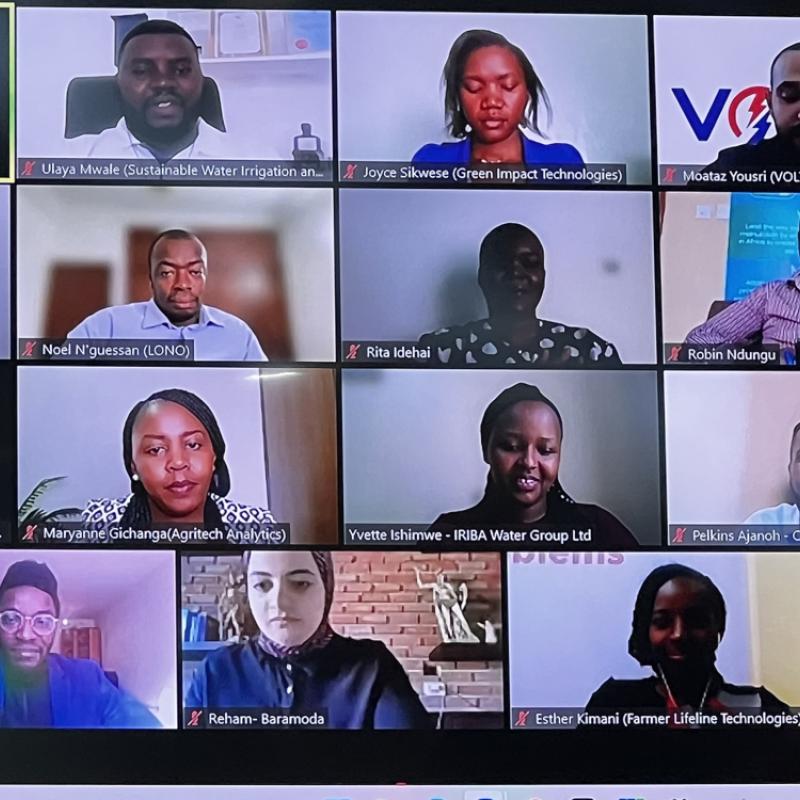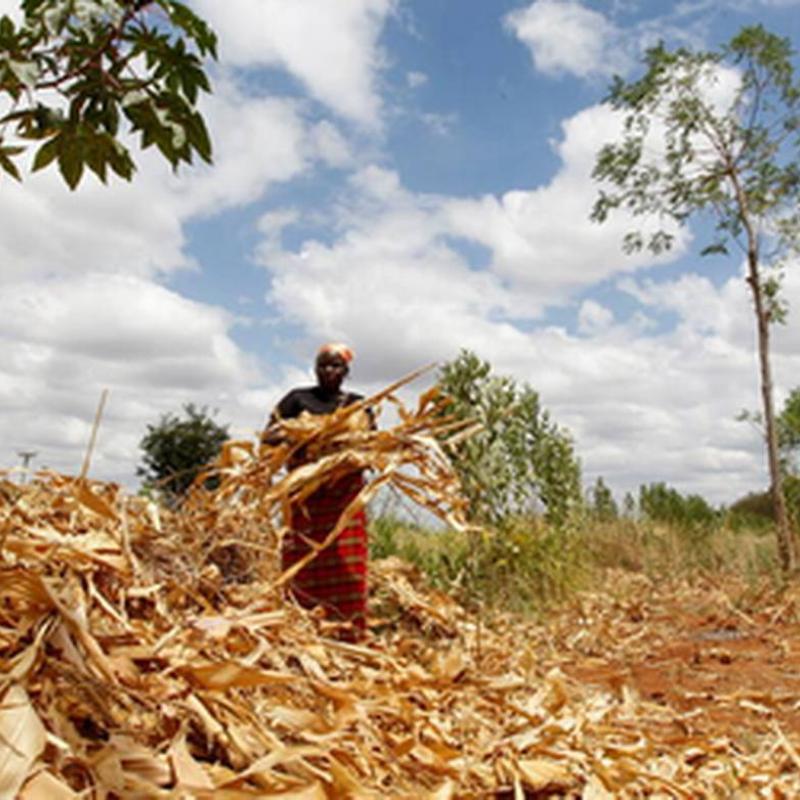
AAAP in the Media
Displaying 1 - 12 of 20
Direct Access Modality to access the Green Climate Fund
Africa is under-served by adaptation finance. Africa received USD 7.9 billion of an annual average of USD 46 billion in adaptation finance for 2019 and 2020. There is a large disparity between climate finance pledged, finance approved, and finance disbursed by the multilateral climate funds. As of January 2022, only 9.23% of global climate financing was earmarked for sub-Saharan Africa for adaptation purposes. Almost one third of the Green Climate Fund’s (GCF's) Direct Access Entities (DAEs) are in Africa, but only 11 out of 54 countries have at least one national accredited entity. DAEs are only accredited for projects with budgets below USD 50 million and are therefore limited in their ability to access funding for larger projects.
This project will develop a concept note as a starting point for a full funding proposal to the GCF. To achieve this, actions will include a desk review of national climate-related development strategies and reference documents in the target country; identification of a promising project idea, in close collaboration with relevant stakeholders; and facilitation of a consultative workshop to discuss the project’s rationale, main intervention areas and implementation arrangements.
Through the Technical Assistance Program (TAP), the Global Center on Adaptation (GCA) will accelerate the mobilization of adaptation finance. Through the direct access modality, GCA will enhance local capacity to formulate robust concept notes for funding consideration by the Green Climate Fund.
AAAP will support the climate risk assessment studies requested by the GCF.
- Four robust project/program concept notes and pipeline developed, for Burkina Faso, Democratic Republic of Congo, Niger and Nigeria.
- For the Democratic Republic of Congo, new sources of climate finance for adaptation and resilience investments identified.
- Development of a roadmap with key actions to prepare the full funding proposal, including the necessary complementary studies, the evaluation of the cost of these studies and the cost of the full funding proposal.
- Relevant initiatives or projects planned or underway and implemented in the project intervention areas
- Development of a portfolio of paradigm-shifting adaptation projects and programs, i.e., development of concept notes, supporting and enhancing funding proposals.
- Building capacities for adaptation finance planning, mobilization and implementation, i.e., Climate Public Expenditure Reviews.
- Direct Access strengthening with the aim to diversify and to increase the delivery channels, i.e., New Accreditation and Accreditation upgrades.
DRC: USD 58.75 million
Burkina Faso: USD 40 million
Niger: USD 50 million
Nigeria: USD 50 million
Total: USD 198.75 million
Youth Adaptation Solutions Challenge Francophone Cohort
The Youth Adaptation Solutions Challenge is an annual competition and awards program for youth-led enterprises (50% women-led) organized by GCA and AfDB as part of the Youth Adapt Flagship Program.
The competition invites young entrepreneurs and Micro, Small and Medium-sized Enterprises in Africa to submit innovative solutions on climate adaptation and resilience. The winners will be part of a 1-year incubator program, which will provide tailored training on business development and adaptation, coaching, networking opportunities, and grants to enable the youth-led enterprises to scale up their innovative businesses and build resilience among marginalized communities in Africa
The objective of the project is to deliver business development services (BDS) to and build the institutional capacity of youth-led enterprises, positioning them to effectively utilize grants offered and to also mobilize additional private capital, scale up climate action and create employment opportunities on the continent.
- Build youth capacity for employability and unlocking access to finance
- Deliver a 1-year incubator program tailored training on business development and adaptation
- Provide coaching and networking opportunities
- Equip young innovators and MSMEs with customized skills and resources to scale up climate adaptation innovations and boost the creation of jobs
- Grant disbursement to the 5 winners of the YouthADAPT winners
- 12-weeks training with practical skills in entrepreneurship and business development and climate adaptation
- Mentorship to enable the winners to execute their business plans, create jobs, and support the continental effort towards climate resilience
- Training materials developed and training workshops delivered tailored to the selected youth-led start-ups
- Support to the youth led-businesses to develop and implement their business plans and to mainstream adaptation and climate resilience in their businesses
- Delivered business development services (BDS) to and building the institutional capacity of youth-led enterprises
- Youth-led enterprises positioned to effectively utilize grants offered and to also mobilize additional private capital
- Scaled up climate action and ability create employment opportunities on the continent
USD 500 Million
African Development Bank Group approves $379.6 million Desert to Power financing facility for the G5 Sahel countries
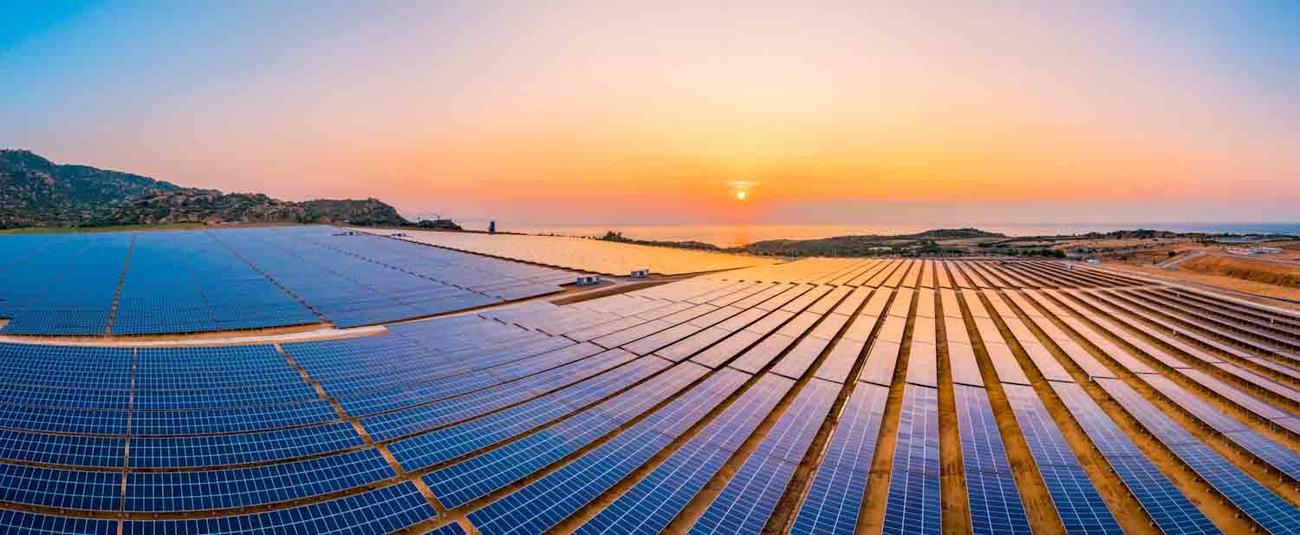
The Board of Directors of the African Development Bank Group has approved the Desert to Power G5 Sahel Financing Facility, covering Burkina Faso, Chad, Mali, Mauritania, and Niger. The Bank envisages to commit up to $379.6 million in financing and technical assistance for the facility over the next seven years.
The Desert to Power G5 Financing Facility aims to assist the G5 Sahel countries to adopt a low-emission power generation pathway by making use of the region’s abundant solar potential. The facility will focus on utility-scale solar generation through independent power producers and energy storage solutions. These investments will be backed by a technical assistance component to enhance implementation capacity, strengthen the enabling environment for private sector investments, and ensure gender and climate mainstreaming.
The facility is expected to result in 500 MW of additional solar generation capacity and facilitate electricity access to some 695,000 households. Over the lifespan of the project, it is expected to reduce carbon emissions by over 14.4 million tons of carbon dioxide equivalent.
The Board of the Green Climate Fund approved $150 million in concessional resources in October 2021 for the facility, which is expected to leverage around $437 million in additional financing from other development finance institutions, commercial banks and private sector developers. The Global Center on Adaptation is providing technical assistance to strengthen adaptation and resilience measures undertaken in the facility as part of the Africa Adaptation Acceleration Program in partnership with the African Development Bank.
The African Development Bank’s Vice President for Power, Energy, Climate Change and Green Growth, Dr. Kevin Kariuki said: “The innovative blended finance approach of the Desert to Power G5 Sahel Facility will de-risk, and therefore catalyze, private sector investment in solar power generation in the region. This will lead to transformational energy generation and bridge the energy access deficit in some of Africa’s most fragile countries.”
Dr. Daniel Schroth, the Bank’s Acting Director for Renewable Energy and Energy Efficiency, added: “The facility will also support the integration of larger shares of variable renewables in the region’s power systems, notably through the deployment of innovative battery storage solutions and grid investments.”
The facility will be implemented as part of the broader Desert to Power initiative, a flagship program led by the African Development Bank. The objective is to light up and power the Sahel region by adding 10 GW of solar generation capacity and providing electricity to around 250 million people in the 11 Sahelian countries by 2030.
.embed-container { position: relative; padding-bottom: 56.25%; height: 0; overflow: hidden; max-width: 100%; } .embed-container iframe, .embed-container object, .embed-container embed { position: absolute; top: 0; left: 0; width: 100%; height: 100%; }
.embed-container { position: relative; padding-bottom: 56.25%; height: 0; overflow: hidden; max-width: 100%; } .embed-container iframe, .embed-container object, .embed-container embed { position: absolute; top: 0; left: 0; width: 100%; height: 100%; }
.embed-container { position: relative; padding-bottom: 56.25%; height: 0; overflow: hidden; max-width: 100%; } .embed-container iframe, .embed-container object, .embed-container embed { position: absolute; top: 0; left: 0; width: 100%; height: 100%; }
The Desert to Power G5 Sahel Financing Facility
The Sahel region faces more challenges to achieving sustainable development in the face of poverty, insecurity and climate change than perhaps any other. The region also includes five of the ten poorest nations in the world (Burkina Faso, Chad, Mali, Mauritania, and Niger). Together these form the G5 Sahel, where more than three quarters of the 86 million people who live there have no access to electricity.
This region also has some of the highest solar energy irradiation and photovoltaic potential in the world, though economic development is constrained in part by the energy supply gap. To take advantage of this opportunity, the Desert to Power G5 Sahel Financing Facility aims to tap this ‘free’ resource by increasing solar power generation and electricity access, while addressing structural challenges in the energy sector.
The overall aim is to assist G5 Sahel countries to adopt low-emission solar power generation through independent power producers and energy storage solutions. Investments are to be supported by technical assistance, gender and climate mainstreaming, and encouraging private sector buy-in.
- Add 500 MW of additional solar generation capacity, and connect 695,000 households to an electricity supply.
- Ensure low-emission development to mitigate effects of climate change, by directly reducing emissions by 14.4 Mt CO2e over 25 years.
- Strengthen regional grid management capacity by building human, social, and institutional capital.
- Create harmonized gender-responsive regulatory frameworks for the electricity sector to lower investment barriers and promote gender-responsive approaches.
- Contribute to improving the quality of life of women and men through more sustainable, reliable and affordable energy access by households and workplaces, and supporting productive uses of electricity, industrialization, and basic public services such as health and education.
- Expand opportunities for manufacturing and industries to provide employment and build prosperity.
The Facility is a part of the broader Desert to Power Initiative, that by 2030 aims to light up and power the Sahel region by adding 10 GW of solar generation capacity and provide electricity to 250 million more people in 11 countries from Senegal to Djibouti.
- Rapid climate risk assessment of transmission systems to provide insights to the location of solar plant
- Upstream capacity building through a regional Masterclass on Climate-Resilient PPPs
- Climate risk assessment to quantify impacts of climate hazards on assets, services, and people
- Adaptation and resilience investment options appraisal, to identify and prioritize adaptation and resilience options and present recommendations of investment for each project;
- Advisory services for results and evidence-based planning, management and M&E of interventions
- Improved investment climate and a sustainable market for independent solar power producers created.
- knowledge and technology transfer facilitated to create opportunities for SMEs in the value-chain.
- Environmental co-benefits driven to increase access to electricity and reduce the need for firewood, reduce deforestation and build resilience to climate change.
- Countries in the Sahel region enabled to transform desert areas into an opportunity to meet their energy needs using clean technologies while delivering multiple adaptation co-benefits.
- Strengthened capacity of national institutions in G5 Sahel countries to ensure long-term sustainable ilitydevelopment of their national renewable energy sectors.
- Reliable environment for private sector solar project financing created.
AfDB investment USD 379.6 million
Total of USD 966.7 million
Amount: AfDB investment of USD 379.6 million, of a total of USD 966.7 million
Reinforcing Resilience to Food and Nutrition Insecurity in the Sahel (P2-P2RS)
The Sahel, which lies between the Sahara Desert to the north and tropical savannas to the south, is one of the largest semi-arid/arid sub-regions globally. As such, the region is highly vulnerable to climate change and other uncertainties. The impacts of climate change may have critical socio-economic consequences for the Sahel, including poor agricultural yields, increased frequency of natural disasters. Already, the number of people in the Sahel suffering from chronic food and nutrition insecurity, poverty and vulnerability to the effects of climate change is rising steadily.
A lasting solution to food and nutrition insecurity in the Sahel requires building resilience to climate change, long-term agricultural sector financing and developing trade and regional integration. Sustained, longer-term investments in household resilience can significantly reduce the cost of emergency assistance, ultimately breaking the cycle of recurring famine. This is the most cost-effective intervention option which meets the basic needs and preserves the dignity of the populations of the Sahel. This idea is central to the Programme to Build Resilience to Food and Nutrition Insecurity in the Sahel (P2RS)
The overall objective of the P2-P2RS is to contribute to the substantial improvement of the living conditions and the food and nutritional security of the populations of the Sahel region.
Specifically, the program aims to i) strengthen the resilience to climate change of agro-sylvo-pastoral producers, including through promotion of climate-smart agricultural technologies in the Sahel and the development of climate intelligent villages; ii) develop the agro-sylvo-pastoral value chains, including through the development and improvement of hydro, meteorology and climate services; and iii) support regional institutions (CILSS, APGMV, CCRS) to strengthen adaptive capacity in the Sahel.
- Design digital adaptation solutions (Digital Climate Advisory Services, DCAS) for the Sahel context
- Investment readiness and infrastructure, institutional and farmer capacity needs for DCAS
- Feasibility study to integrate DCAS into agricultural extension and agrometeorological advisory to smallholder farmers and pastoralists
- 1 million rural households have access to digital or data-enabled climate-smart technologies
- 500,000 smallholders have adopted adaptation practices
- 5 million smallholders have access to climate services;
- Development and improvement of hydro, meteorology and climate services
- The development of climate-intelligent villages
- Promotion of climate-smart agricultural technologies in the Sahel
- Resilience to food and nutrition security built for the targeted populations
USD 300 million
Global Leaders Rally Support and Finance for the Africa Adaptation Acceleration Program to Tackle Climate Change in Africa
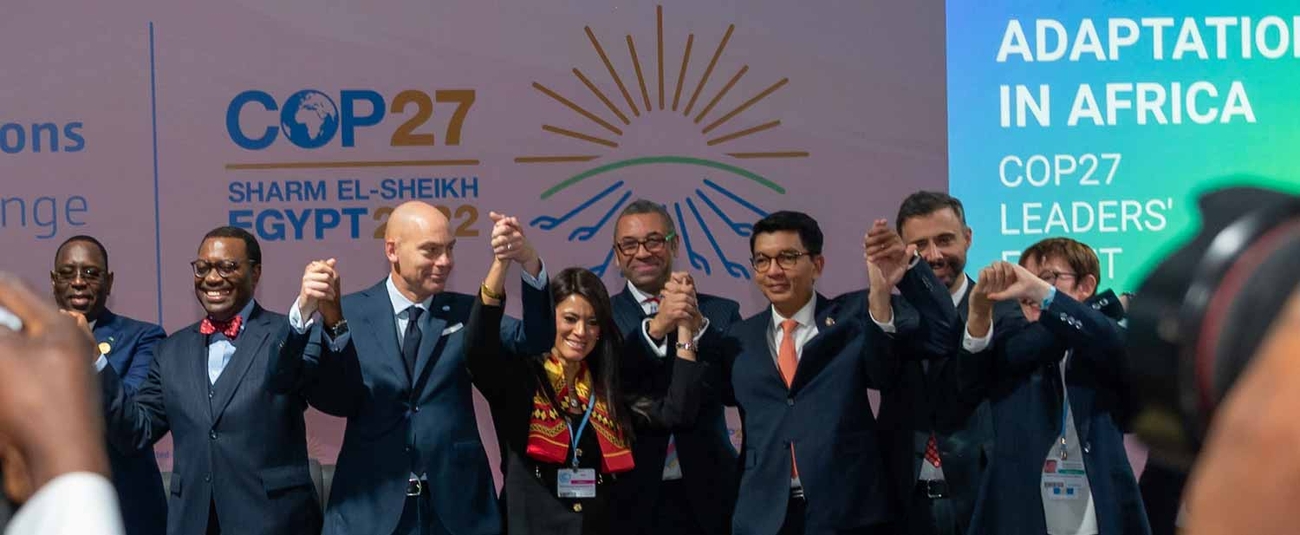
Global leaders on Tuesday rallied around climate adaptation for Africa. They attended the Africa Adaptation Leaders’ Event, convened by African Union Chair President Macky Sall of Senegal, Global Center on Adaptation CEO Patrick Verkooijen, and African Development Bank Group President Akinwumi Adesina.
The event took place at the global climate summit (COP27) in Sharm El-Sheikh, Egypt. It underscored the critical need for climate adaptation in Africa and responded to the call for the capitalization of the Africa Adaptation Acceleration Program (AAAP).
“This is a pivotal step in the fight against climate change,” African Union Chair President Macky Sall said. “The commitments made by Africa’s partners will give the Africa Adaptation Acceleration Program the boost that it needs to transform the development trajectory of the world’s most climate exposed continent. I am confident in the ability of the AAAP to deliver results for Africa.”
The Africa Adaptation Acceleration Program is an Africa-owned and Africa-led initiative developed by the Global Center on Adaptation (GCA) and the African Development Bank (AfDB) in close collaboration with the African Union. It serves as the implementation of the Africa Adaptation Initiative (AAI) to mobilize $25 billion to implement, scale and accelerate climate adaptation across the Africa. Since 2021, AAAP has mainstreamed climate adaptation in over$3.5 billion of investments in 19 countries.
United Nations Secretary-General António Guterres said: “I want to express my total solidarity for the Africa Adaptation Acceleration Program […] I urge the international community to support Africa to mobilize the technical & financial resources for scaling up transformative adaptation.”
“With this innovative program, Africa has developed a plan to grow, create jobs and opportunities for people, and to be resilient against the climate crisis,” said President Akufo-Addo of Ghana. “AAAP’s singular focus on the issue of climate adaptation will also contribute to greater stability and progress in Africa and around the world. AAAP is aligned with Ghana’s plans to address climate change as it chairs the Climate Vulnerability Forum (CVF) to lead efforts from the world’s most climate vulnerable countries to spur and mobilize investment through the Climate Prosperity Plans."
James Cleverly, Secretary of State for Foreign, Commonwealth and Development Affairs of the United Kingdom announced that the UK will provide £200 million to the African Development Bank’s Climate Action Window. This is in addition to the £20 million announced at COP26 in Glasgow to the AAAP Upstream Financing Facility.
Cleverly noted: “Climate change is having a devastating impact on countries in Sub-Saharan Africa facing drought and extreme weather patterns, which have historically received a tiny proportion of climate finance. This new mechanism […] will see vital funds delivered to those most affected by the impacts of climate change, much more quickly.”
Prime Minister Mark Rutte of the Netherlands followed through on the commitment made at the Africa Adaptation Summit held at the Global Center on Adaptation in September to confirm that the Netherlands will contribute EUR110 million to the AAAP, with EUR10 million in support for the Upstream Financing Facility hosted by GCA and EUR 100 million for the Climate Action Window of the African Development Fund at the African Development Bank as part of the Netherlands’ commitment to dedicate half of its climate funding, fully grant based, to climate adaptation, with a focus on Africa.
Norwegian Prime Minister Jonas Gahr Støre echoed African leaders’ calls for countries to rapidly scale up finance for climate adaptation, stating: “The climate crisis is here and now. Years of progress are at risk.”
“The AAAP Upstream Financing Facility is the delivery mechanism of adaptation and will use millions to leverage the billions that is required for adaptation,” he continued. “AAAP projects will generate effective climate adaptation outcomes. Adaptation is a growth agenda. A jobs agenda. And a prosperity agenda. On behalf of Norway, I am looking forward to continuing this partnership, investing in it, and supporting it with the Global Center on Adaptation.”
International Monetary Fund Managing Director Kristalina Georgieva emphasized the need to accelerate adaptation in Africa, stating: “It is paramount to support Africa’s adaptation because Africa will not reach its tremendous potential without it. AAAP complements the IMF’s Resilience and Sustainability Trust, which helps countries address external shocks such as climate change and ensure sustainable growth that can give Africa a chance to leapfrog outdated development models.”
African Development Bank Group President Dr. Akinwumi Adesina said: “Africa is suffering from the devastating effects of climate change. Our continent is being short changed by climate finance. The contributions towards the Africa Adaptation Acceleration Program’s Upstream Financing Facility and the Climate Action Window – which the African Development Bank manages – will help capitalize the program. With increased capital, we can better deliver the investment needed to bridge the adaptation finance gap. We want to ensure that the most vulnerable communities can benefit from a sustainable and prosperous future.”
Endorsing the outcomes of the high-level meeting, Patrick Verkooijen, CEO of the Global Center on Adaptation, closed with a statement emphasizing the AAAP’s impact to date, noting that “there is no pause button on the climate crisis. Africa must adapt to the threat of climate change, and it must adapt now.”
“Through the AAAP,” he continued, “Africa has charted its path towards a climate-resilient future for its youth, its economic growth, and for its prosperity.”
About the Global Center on Adaptation
The Global Center on Adaptation (GCA) is an international organization which works as a solutions broker to accelerate action and support for adaptation solutions, from the international to the local, in partnership with the public and private sector, to ensure we learn from each other and work together for a climate-resilient future. Founded in 2018, GCA is hosted by the Netherlands, working from its headquarters in Rotterdam with a knowledge and research hub based in Groningen. GCA has a worldwide network of regional offices in Abidjan, Côte d’Ivoire, Dhaka, Bangladesh and Beijing, China. Through this evolving network of offices and global and regional GCA teams, the organization engages in high-level policy activities, new research contributions, communications, and technical assistance to governments and the private sector.
About the African Development Bank
The African Development Bank Group is Africa’s premier development organization. Its overarching objective is to spur sustainable economic development and social progress in its regional member countries, thus contributing to poverty reduction across the continent.
The Bank Group achieves this objective by mobilizing and allocating resources for investment in African countries and providing policy advice and technical assistance to support development efforts.
In 2015, all multilateral development institutions agreed on the same set of objectives, the United Nations Sustainable Development Goals.
Learn more: https://www.afdb.org/
About the Africa Adaptation Acceleration Program
The Africa Adaptation Acceleration Program (AAAP) is a joint initiative of the African Development Bank and the Global Center on Adaptation (GCA). It aims to mobilize $25 billion, over five years, to accelerate and scale climate adaptation action across the continent. This ambition is delivered through the AAAP Upstream Financing Facility managed by the Global Center on Adaptation and the African Development Bank’s climate action window in the ADF replenishment. AAAP works across four pillars to achieve transformational results: Climate-Smart Digital Technologies for Agriculture and Food Security; African Infrastructure Resilience Accelerator; Youth Empowerment for Entrepreneurship and Job Creation in Climate Adaptation and Resilience and Innovative Financial Initiatives for Africa. AAAP has already guided over $3.5 billion of upstream investments in 19 countries with every dollar spent influencing $100 downstream.
COP27 - COP27 Leaders' Event, Accelerating Adaptation in Africa (DAY 2)
Africa Adaptation Acceleration Program showcases African youths driving climate innovation
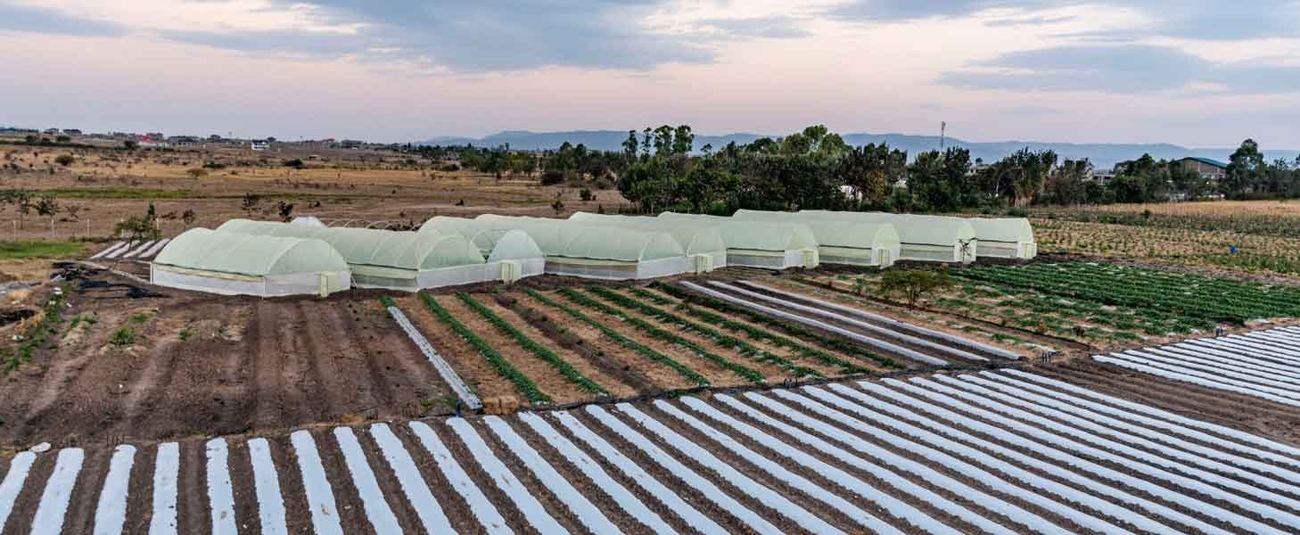
The Africa Adaptation Acceleration program (AAAP) – a joint initiative of the African Development Bank and the Global Center on Adaptation – recently showcased its initiative to harness the dynamism and leadership of Africa’s youth to drive climate adaption innovation.
On the side-lines of the recent 3rd Gobeshona Global Conference(link is external), AAAP brought together participants in its YouthADAPT program to share their experiences with the program as well as strategies to scale up youth-led approaches to adaptation
In his opening remarks, Dr. Kevin Kariuki, African Development Bank Vice President for Power, Energy, and Climate & Green Growth underscored young people’s integral role in Africa’s sustainable development.
“Youth form the backbone of Africa’s population, constituting over 60% of the population. The continent’s sustainable development hinges on harnessing this demographic dividend,” Kariuki said. “The AAAP, through its YouthADAPT pillar, has so far supported 35 youth-led enterprises in 14 African countries with $3.5 million to drive climate actions in sectors such as agriculture, waste management, renewable energy, water and sanitation,” Kariuki added. YouthADAPT is one of AAAPs four pillars for accelerating climate adaptation.
Caroline Mukuhi Mwangi, founder of Kimplanter Seedling(link is external) and Nurseries Limited, said her company was already seeing the benefits of participation in the program. Kimplanter provides drought resistant seedlings that boost food production and food security in Kenya.
Mwangi said, “We have ventured into new markets in semi-arid regions and expanded our seedling varieties, increasing our revenue by 36% as a result of AAAP support. Our customer base has also grown from 8,000 to 16,000 farmers and we have increased our staff from 17 to 32, all of whom are women or youth.”
Aramide Abe, the Program Lead of Jobs for Youth & Entrepreneurship at the Global Center on Adaptation(link is external) confirmed that participating enterprises have already begun to show results. She said some have seen revenues rise by up to 50 percent. A fifth have ventured into new markets and have raised over $106,000 in additional funding from different sources.
Juveline Ngum, the founder of Bleaglee Waste Management Limited, a Cameroon-based start-up company using drone technology to tackle waste disposal, also stressed the benefits of participating in YouthADAPT.
“We have expanded our waste disposal management solution from west Cameroon into Douala, effectively using drones to detect clogged drainages and utilizing data for demand driven waste management,” Ngum said. Now, we aim to expand across national borders into Dakar, Senegal.”
Noël N'guessan’s Cote d’Ivoire-based company, LONO(link is external) – a winner of the 2022 YouthADAPT challenge – has patented technology for the production of organic fertilizer. The company has also introduced modular and mobile bio digesters for the agri-food sector. Biodigesters use microbes and other bacteria to break down organic waste including fat, greases, and even animal manure.
Still, Nguessan said challenges remained. “The cost of prototyping hardware equipment can be prohibitively high, resulting in lengthy project development cycles, “he said. He pointed to financial management training as vital for youth-led businesses.
The session also featured presentations by African Development Bank partners and other global organizations that have rolled out similar initiatives to YouthAdapt.
Sandra Simbiri, Program Specialist at UNICEF’s Generation Unlimited(link is external), said:
“Supporting entrepreneurs through STEM principles is key to preparing the young for technological innovations.”
Alfred Asiko, Senior Market Engagement Manager for the ClimateTech Programme at GSMA(link is external), a mobile technology association, said it has played a role in empowering youth to deploy such technologies as the Internet of Things, artificial intelligence and blockchain to tackle climate challenges.
“Through our innovation fund, we offer grants to climate startups, with a focus on supporting resilient solutions that utilize frontier technologies. We also provide skills development and training to help entrepreneurs succeed in scaling their innovations,” Asiko said.
He said that venture capital (VCs) firms had a critical role to play. ”We need to see more VCs stepping up and taking over from development finance institutions (DFIs) in providing financing and support to youth-led businesses,” he added.
YouthADAPT targets reaching 10, 000 African youth-led enterprises by 2025, promoting innovation and inclusive growth for young people in climate resilient jobs and through youth enterprise development. The AAAP’s other three pillars are Climate-Smart Digital Technologies for Agriculture and Food Security; the African Infrastructure Resilience Accelerator and the Innovative Financial Initiatives for Africa
The third annual Gobeshona Global Conference, organized by the International Centre for Climate Change and Development, took place virtually from 10-16 March 2023. It focused on monitoring Locally- Led Adaptation (LLA) and resilience.
African Development Bank and Global Center on Adaptation work with partners to enhance capacity to access climate adaptation funding
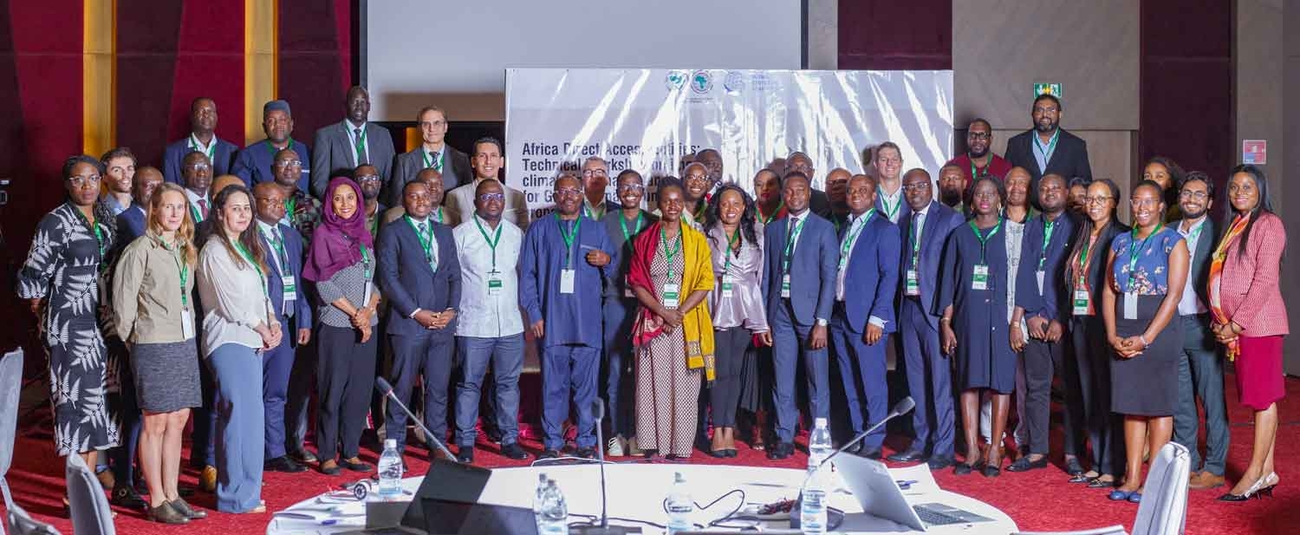
The African Development Bank and Global Center on Adaptation today launched a new initiative under the Technical Assistant Programme of the Africa Adaptation Acceleration Program(link is external) to help African countries access more climate adaptation funding.
A climate rationale is the scientific basis of a project and describes the climate change scenario, outlining the climate problem in a particular country (e.g., flooding, droughts for an adaptation project) and region that the project will be implemented in. The rigorous requirement by Green Climate Fund for climate rationale based on 30 years of point-source climate data has led to a high attrition rate for funding proposals with an adaptation focus.
Through this new initiative, Direct Access Entities in Africa will receive additional support to enhance their capacity with regards to climate data, tools, and methodologies that help them meet the critical requirements of climate rationale for compelling funding proposals that could merit approval by the GCF Board.
The GCF is one of the mechanisms of the United Nations Framework Convention on Climate Change to significantly contribute to the global efforts towards attaining the goals set by the international community to combat climate change. It supports developing countries to limit or reduce their greenhouse gas emissions and adapt to climate change impacts. For adaptation, it allocates resources based on: (i) the ability of a proposed activity to demonstrate its potential to adapt to the impacts of climate change by promoting sustainable development and a paradigm shift; (ii) the urgent and immediate needs of vulnerable countries, in particular, Least Developed Countries, Small Island Developing States and African States.
The African Development Bank and the Global Center on Adaptation will work with their partners to select at least four proposals each year based on the pipeline of Direct Access Entities funding proposals that require additional technical assistance and guidance. Through its Technical Assistance Programme (TAP), the Global Center on Adaptation will provide technical assistance for a selected set of funding proposals.
The launch event for the new initiative took place in Abidjan, Cote d’Ivoire, on the 6th and 7th of December with program partners including the Green Climate Fund (GCF), World Meteorological Organization (WMO), Africa Climate Change Fund, ClimDev Special Fund and Regional Climate Centers in Africa.
23 Direct Access Entities accredited or at the final stage of accreditation to GCF participated in the two-day event with representatives of regional and international accredited entities, including the Development Bank of Southern Africa, the International Fund for Agricultural Development, the West African Development Bank, the Africa Finance Corporation and the United Nations Environment Program.
In opening remarks,Professor Anthony O. Nyong, Senior Director for Africa at the Global Center on Adaptation said , “Africa is on the frontline of our climate emergency. Through this new initiative, we aim to significantly increase the flow of adaptation finance to the region. Given the central role of the Green Climate Fund, the unprecedented volumes of funding it offers, the range of financial instruments it provides, and its different access modalities, we will initially focus this initiative on accessing GCF resources, but this is just the start of our long-term partnership with African countries to mobilize finance for climate adaptation across the continent. »
Dr. Al Hamndou Dorsouma, Acting Director of the Department of Climate Change and Green Growth at the African Development Bank, said, “climate rationale for GCF funding proposal is like the foundation of a building. A solid building should have a solid foundation and I am glad our bank has forged the collaboration with relevant regional and international institutions to help direct access entities secure approvals for more funding proposals on adaptation with strong climate rationale.”
Dr. Kevin Horsburgh, Lead Climate Scientist representing GCF, noted, “To promote transformational projects and catalyze climate finance at scale, GCF follows a four-pronged approach: transformational planning; catalyzing innovation; de-risking high impact projects; and aligning finance with sustainable development. Each step needs the best available information to assist decision-making. The GCF is pleased to be working with the WMO to create the bridge between climate information and all those who need to use it, to improve access to climate finance.”
Amir Delju, Senior Scientific Officer with the World Meteorological Organization, said, “Effective and progressive response to the urgent threat of climate change should be based on ‘the best available scientific knowledge.’ We recognize that it is very challenging for least developed countries to meet this requirement. As an expert service provider, WMO will continue providing the full value cycle of climate services, from data to analysis, information production, interpretation of the findings, and expert advice.”
Contact:
- Romaric OLLO HIEN, Communication and External Relations Department, African Development Bank, email: media@afdb.org(link sends e-mail)
- Technical Contact: Timothy Afful-Koomson, GCF Coordinator, African Development Bank, email: t.afful-koomson@afdb.org(link sends e-mail)
- Technical Contact: Ali Haider, Senior Program Officer, Climate Finance, Global Center on Adaptation, email: ali.haider@gca.org(link sends e-mail)
Africa Climate Change Fund launches Women and Youth Entrepreneurship Project
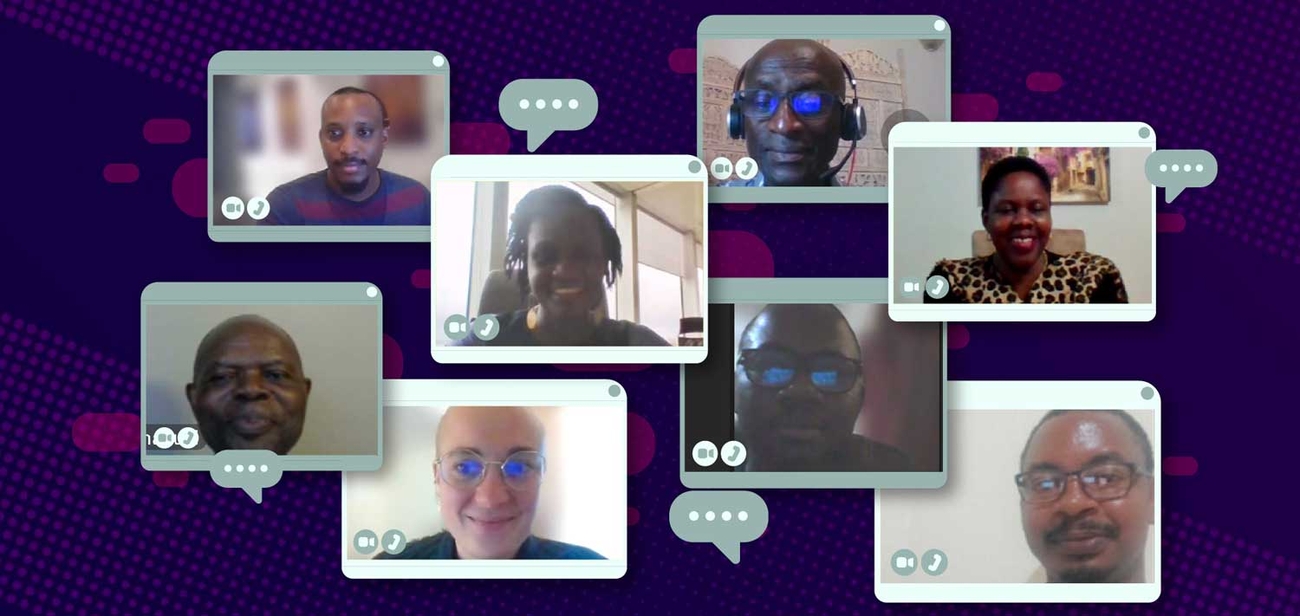
The Africa Climate Change Fund (ACCF) Secretariat has launched a scheme to support mechanisms for climate adaptation finance for women entrepreneurs and youth.
The scheme, “YouthADAPT: Empowering Women and Youth for Entrepreneurship and Job Creation in Climate Adaptation and Resilience,” will develop innovative, transformative climate-resilient bankable projects aligned with African countries’ Nationally Determined Contributions.
YouthADAPT is a flagship program under the Africa Adaptation Acceleration Program (AAAP), which is unlocking the untapped potential of youth in Africa to drive resilience and green enterprise.
The virtual launch followed the approval of a $1 million grant funding by the ACCF’s development partners for the project. The event rallied together stakeholders, including the project team, quality control, adaptation, gender, and communication experts, and climate change and green growth experts to share experiences.
ACCF Coordinator Rita Effah, and the Portfolio Officer, Lucy Debrion, explained the Fund’s operational guidelines on Bank-implemented projects.
AAAP Coordinator and Principal Climate Change Officer Edith Ofwona Adera said, "African youth are leading the way, not in talk, but in concrete climate action; as agents of change, innovators, and entrepreneurs.”
She said the scheme would support women-led local enterprises promoting adaptation solutions to create additional jobs.
Adera thanked the ACCF for collaborating on the projects. Adera also commended the Fund for its role in facilitating the production of proposals. “That makes our work easier,” she added.
Following the launch, the AAAP secretariat will regularly engage with the ACCF Secretariat on significant project milestones to ensure that the objective is fully accomplished.
Since 2017, the ACCF Governing Committees have approved 26 projects estimated at $15.87 million.
The AAAP will implement the project. For more information on ACCF and AAAP, please visit http://accf.afdb.org and www.afdb.org/aaap

